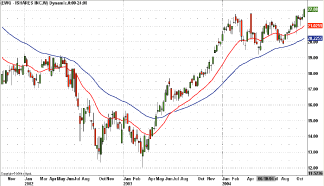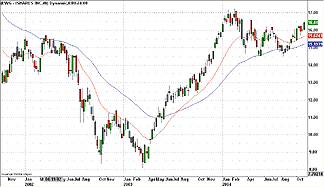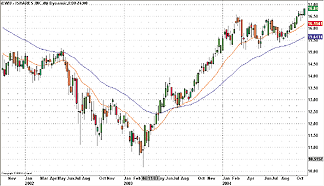iShares are an investment product from Barclay's Global Investors, and represent among the broadest variety of exchange-traded funds (ETFs) available to institutional and retail investors alike. iShares can be bought and sold like stocks and are used by many investors instead of mutual funds in order to take advantage of the low expenses involved in trading ETFs.
The MSCI Sweden Index Fund (EWD)

The MSCI Sweden Index Fund (EWD) is built to provide investors and traders with exposure to the equities of companies operating in and out of Sweden. The fund is geared to mirror the performance of the publicly traded stocks of the Swedish stock market as represented by the MSCI Sweden Index. Major components of EWD include Telefonaktiebolaget LM Ericsson Class B, Nordea AB, Hennes & Mauritz AB Class B, and Volvo AB Class B. Top industry sector representation consists of technology hardware and equipment, capital goods, and banks.
The Swedish stock market, as represented by the MSCI Sweden Index Fund, has enjoyed a bull market ever since breaking out above its 20- and 50-week moving averages in the late spring of 2003. The exemplary uptrend topped temporarily at the beginning of 2004. However, after some sideways movement through much of 2004, the EWD was back to its bullish ways - setting a new multiyear high with a breakout in October.
What they say: "But rather than remain a failed economic model, Sweden has in the past decade - and under Mr. Persson"s leadership since 1996 - remodeled and refinanced its welfare system, offering an example to countries such as Germany that wish to preserve valued social institutions but bring public spending under control. Sweden"s economic growth over the past decade has easily outpaced that of Germany and the average for the members of the Eurozone." - "Can Germany Learn From How Sweden Revived Its Ailing Economy?" Ralph Atkins and Nicholas George, Financial Times, October 20, 2004.
MSCI France Index Fund (EWQ)

The MSCI France Index Fund (EWQ) is designed to provide investors and traders with exposure to the equities of companies operating in and out of France. The fund is geared to mirror the performance of the publicly traded stocks of the French stock market as represented by the MSCI France Index. Major components of EWQ include Total SA, Sanofi-Aventis, Bnp Paribas SA, France Telecom SA, and Vivendi Universal SA. Top industry sector representation consists of energy, banks, and pharmaceuticals and biotechnology.
As represented by the MSCI France Index, the French stock market bottomed in the spring of 2003 and has been in bull market mode for well over a year. While it appeared as if French stocks had topped early in 2004, it now appears to have been little more than a trading range before a renewed push higher. In recent weeks, EWQ has even managed to establish a new multiyear high vis-à-vis its previous January 2004 "peak."
What they say: "[French President Jacques] Chirac has brought a large business delegation on the trip which is heavily focused on trying to secure greater access for French firms to Chinese markets. During his speech in Chengdu, Chirac in particular talked up the French nuclear power industry, aircraft manufacturer Airbus Industrie and French expertise in building high-speed trains. A number of contracts were to be signed during the visit which may help to redress France"s trade deficit with China, which currently stands at around six billion dollars." - "Chirac Urges French Business To Grasp Huge Opportunities In China," TurkishPress.com, October 9, 2004.
MSCI Germany Index Fund (EWG)

The MSCI Germany Index Fund (EWG) is designed to provide investors and traders with exposure to the equities of companies operating in and out of Germany. The fund is built to mirror the performance of the publicly traded stocks of the German stock market as represented by the MSCI Germany Index. Major components of EWG include Siemens AG, Deutsche Telekom, Deutsche Bank, and DaimlerChrysler AG. Top industry sector representation consists of utilities, capital goods, and automobiles and their components.
EWG has not set a new multiyear high as has its cohort in Sweden or France. But EWG's price appreciation over the past year and a half is equally remarkable - if not more so. After marking a bottom in March 2003 near $8 per share, EWG went on to double by January 2004. The EWG made an initial top at the time, and then slipped into a bearish consolidation range until the late summer. Since that time, EWG has rallied back above its 50-week moving average.
What they say: "Will globalisation see the shrinking of German car production from 5.5m cars a year to around 3m, closer to that of France and Spain? That seems to be the trend now that cheaper manufacturers can be found in central Europe. Meanwhile, Germany will attempt to turn itself into more of a service economy like Britain. New job prospects for former car workers are not great. The government"s job-creation schemes remain the least convincing of its reforms." - The Economist, "The Day The Factories Stopped," October 23, 2004.
MSCI United Kingdom Index Fund (EWU)

The MSCI United Kingdom Index Fund (EWU) is built to provide investors and traders with exposure to the equities of companies operating in and out of the United Kingdom. The fund is designed to mirror the performance of the publicly traded stocks of the United Kingdom's stock market as represented by the MSCI United Kingdom Index. Major components of EWU include British Petroleum, Hsbc Holdings, Vodafone Group, GlaxoSmithKline, and the Royal Bank of Scotland. Top industry sector representation consists of banks, energy, pharmaceuticals, and biotechnology.
Along with the other European exchange-traded funds noted here, the Ewu has also enjoyed a powerful bear market since its bottom in March 2003. Topping with most indexes and averages in January 2004, the EWU not only managed to remain above its 50-week moving average, but also went on to set new multiyear highs in recent weeks.
What they say: "The number of Britons having debt problems has 'risen significantly', Citizens Advice has said. The charity, which runs a chain of advice centers, said the number of people asking for help with debt rose by 35,000 in the past year to 706,000. Citizens Advice blamed irresponsible lending for the rise and said UK credit laws must be changed urgently. However, a banking body said that the charity was 'stereotyping" lenders and that law changes should not be rushed. In July, UK personal debt topped the £1 trillion mark for the first time." - BBC News.com, " 'Significant" Rise In Debt Woes," October 29, 2004.
Excerpted from an article originally published in the March 2005 issue of Technical Analysis of STOCKS & COMMODITIES magazine. All rights reserved. © Copyright 2005, Technical Analysis, Inc.
Return to March 2005 Contents